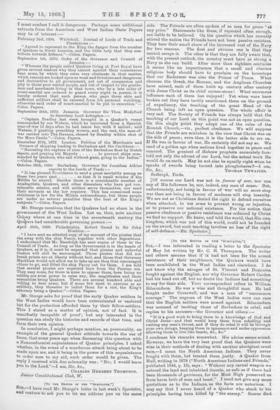[To TDB EDITOR Or TRU " SPROTATOR."] have read Mr.
Sturges letter in last week's Spectator, and venture to ask you to let me address you on the same side. The Friends are often spoken of as men for peace "at any price." Statements like these, if repeated often enough, are liable to be believed. On the question which has recently stirred the nation the Friends have not been passive resisters. They bear their small share of the increased cost of the Navy for two reasons. The first and obvious one is that they cannot escape it. The other is that they are fully aware that, with the present outlook, the country must have as strong a Navy as she can build. After more than eighteen centuries it seems like an impertinence that a small and obscUre religious body should have to proclaim on the housetops that our Redeemer was also the Prince of Peace, What chances the Greek, the Roman, and the Anglican Churches have missed, each of them built up century after century with Jesus Christ as its chief corner-stone! What enormous influence each of them has enjoyed! Yet when wars have broken out they have tacitly sanctioned them on the ground of expediency, the teaching of the great Head of the Church being left an open question. The whole affair is very sad. The Society of Friends has always held that the teaching of our Lord on this point was not an open question. On this single point they adopt one of the rules of the Romish Church,—viz., perfect obedience. We will suppose that the Friends are mistaken in the view that Christ was on the side of peace ; even then it is the better side to err on. If He was in favour of war, He certainly did not say so. We read of a golden age when nations lived together in peace and concord. The greatest of Hebrew prophets accurately fore- told not only the advent of our Lord, but the actual work He would do on earth. May he not also be equally right when he
speaks of swords being turned into ploughshares am,
[Of course our Lord was not in. favour of war, nor can any of His followers be, nor, indeed, any man of sense: But, unfortunately, not being in favour of -war will no more stop war than not being in favour of madness will stop insanity. We are not as Christians denied the right to defend ourselves when attacked, to use arms to prevent wrong or injustice, or to preserve our national existence. For the notion that passive obedience or passive resistance was ordained by Christ we find no support. He knew, and told the world, that His own kingdom, which was not of this world, could not be founded on the sword, but such teaching involves no loss of the right of self-defence.—En. Spectator.]










































 Previous page
Previous page